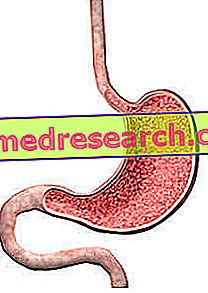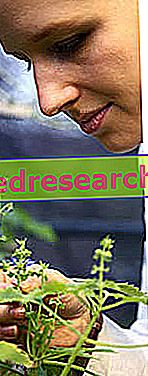Key points
Gastritis is an acute or chronic inflammatory process of the gastric wall.

Causes
- Acute gastritis is generally due to indigestion or poor nutrition, characterized by excesses, spicy foods and hyperlipidic and irritating foods for the gastric mucosa. Alcohol, smoking and NSAID abuse can also induce acute gastritis.
- Chronic gastritis is often due to infections sustained by Helicobacter pylori . However, it also appears that other factors may favor the chronic variant of gastritis: AIDS, psychosomatic disorders, renal and hepatic failure, Crohn's disease and autoimmune diseases.
Symptoms
All variants of gastritis have in common gastric pyrosis (heartburn). In addition to this symptom, gastritis is manifested by dyspepsia, loss of appetite, diarrhea, abdominal cramps, flatulence, meteorism, halitosis and vomiting.
Diagnosis
A suspicion of gastritis can be confirmed with the following diagnostic tests: medical history, test for Helicobacter pylori (blood test, stool analysis, breath test), gastric endoscopy, gastric biopsy, upper digestive system radiography.
Treatment
Treatment depends on the underlying cause. For the treatment of acute gastritis it is generally sufficient to correct incorrect eating habits, possibly also modifying some behavioral attitudes (alcohol abuse, smoking and immoderate NSAID intake) which could accentuate the symptoms. The chronic form (often caused by H. pylori ) requires antibiotic treatment associated with gastroprotective drugs and / or proton pump inhibitors
Definition of gastritis
Gastritis is an acute or chronic inflammation involving the stomach wall. More than a disease in itself, gastritis is considered a heterogeneous and multifaceted group of disorders, all of which have a recurrent element: the phlogosis of the gastric wall. Today, in fact, in addition to being a discomfort that affects men and women of every race, age and social rank, gastritis manifests itself in different guises: some patients suffering from gastritis complain of a simple and temporary gastric pyrosis (or heartburn that will tell if you wish); in others, on the other hand, the disorder causes aerophagia, dyspepsia, lack of appetite, to the point of degenerating into heavy and debilitating symptoms such as diarrhea, abdominal cramps, meteorism, halitosis and vomiting.
The type of symptoms, as well as the intensity with which they manifest themselves, is heavily conditioned by the triggering cause. Fortunately, in most cases, mild gastritis can soon be resolved by correcting some incorrect eating behaviors. Other times, instead, where the disease assumes a chronic or particularly aggressive connotation, the therapy must be more drastic.
Classification and causes
We begin immediately by distinguishing two main forms of gastritis:
- Acute gastritis: violent inflammation of the gastric mucosa which tends to resolve in a relatively short period of time
- Chronic gastritis: gastric symptoms occur gradually, but last for long periods
Both the acute form and the chronic variant can in turn be differentiated into other sub-categories, each of which is an expression of different etiopathological factors (or causal factors).
Please note
Let us briefly recall that mild forms of gastritis can be caused by indigestion or an unbalanced diet, rich in spicy, spicy, hyperlipidic and irritating gastric mucosa. In similar situations, the correction of eating habits is generally sufficient to reverse the pathology.
To get an immediate idea about the different causes of gastritis, we have a simplified table.
| ACUTE GASTRITIS | |
| variants | Causes |
| Common gastritis |
|
| Erosive or hemorrhagic gastritis |
|
| Corrosive gastritis |
|
| Acute ischemic gastritis |
|
| Acute radiation gastritis |
|
| Acute infectious gastritis |
|
| CHRONIC GASTRITIS | |
| variants | Causes |
| Chronic atrophic gastritis |
|
| Chronic NSAID gastritis |
|
| Chronic infectious gastritis |
|
| Psychosomatic gastritis |
|
| Other causes of chronic gastritis |
|
Gastritis - Video: Causes, Symptoms, Cures
X Problems with video playback? Reload from YouTube Go to Video Page Go to Wellness Destination Watch the video on youtubeRisk factors
As analyzed, there are many variants with which gastritis can occur. In addition to the causes listed above, numerous risk factors have been identified that can predispose the patient to gastritis. Among the most noteworthy, we recall:
- Alcohol abuse. Alcoholic substances, exerting a corrosive action at the level of the stomach, progressively irritate and corrode the gastric wall, making it more susceptible to the action of acidic gastric juices. Alcoholism is one of the causes most involved in acute and chronic gastritis. To learn more: read the article on alcohol and gastritis
- Coffee abuse. To learn more, read the article on coffee and gastritis
- Regular intake of analgesics. The main defendants are: acetylsalicylic acid, ibuprofen and naproxen, possible risk factors for both chronic gastritis and acute form
- Reflux disease, risk factors for gastritis and gastric ulcer (two pathological disorders often linked).
- Advanced age: the elderly are the category most at risk for gastritis. In fact, the gastric wall tends to weaken as age progresses
- Recurrent Helicobacter pylori infections . It is however necessary to remember that an infection supported by this pathogen does not necessarily trigger the symptoms of gastritis.



